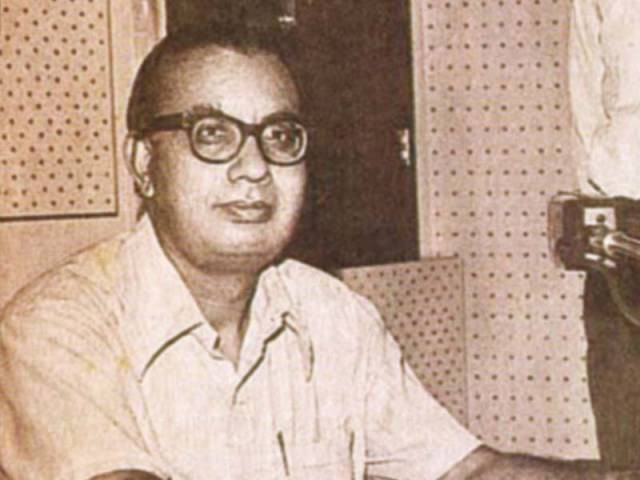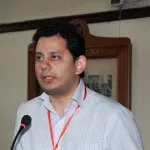He also left behind about a dozen odd intensely political poems showing an uncanny awareness of the horrors of war and imperialism. They range from colonial machinations in the Middle East at the beginning of the Cold war and the advance of Mao Tse-tung’s armies to the victory in Peking to the horrors of the Korean war, and from a dirge mourning the defeat of Arab forces to Israel in 1967 to the failures of world bodies like United Nations Children’s Fund (UNICEF) to provide adequate food to war-ravaged children. In the preface to his first collection of poetry Chand Nagar (Lunar City), Insha admits:
“My longer poems are mostly the product of the conflict between the bitter realities of my surroundings and my romantic temperament…The Korean War shook me up and its echoes will be heard in all my poems until the present. For me, war is not a headline of any newspaper but it signifies fire and destruction, and a soldier is not merely a uniform, gun and medal, but a body and form of a son, brother and loved one.”
On the belated occasion of Insha’s 90th birthday (June 15), I am sharing an original translation of one of his lyrical anti-war poems, Aman ka Aakhri Din (the last day of peace), originally published in 1952, which is still a relevant warning about the horrors of war. As readers will undoubtedly see, here he comes across as a deeply political and prescient poet, a far cry from the anomie of his exquisite ghazals and the affability of his sophisticated humour.
“Why in every headline of the evening papers today
Every word weaves a tangled web
With every cloud a doubt emerging
Thoughts lie writhing in the corners of the mind
Now every line reeks of gunpowder
It is difficult crossing every page unsuspected
A multitude of memories comes forward like a fleet for a night ambush
Let’s see what happens as the morning arrives
So many thoughts one had never thought before
So many faces one had never seen before
With faces like nightmares embracing every vein and fibre
All those marks becoming hazy by the evening
The storm is about to rise from the West
There is still hope in the veiled lamp
The atom with its embrace of a thousand upheavals
The Adam whose collar is still torn with grief
A peace which was found after offering a life
A tear still luminous on the dead faces
That gun which will be subdued somewhere one day
That mass of bombers comes advancing
Sometimes over the peasant’s house, sometimes over his corn
A merciless bolt of lightning waves
Sticks leap from every corner
Sparks burn village after village
The pension given to the brave soldier in return for which
He is given a jerky crutch to one side
A platoon which flew to reach the field
Those loved ones who never returned from there
That medal awarded after years of toil
And is left shining on the chest of a corpse
A delicate twig in a garden of youth
Blown to bits by the flying parts of the bomb
The fruit of his aged parents’ years of prayer
He breathed his last in some alien field
The threshold of the house will not buzz with the returning footsteps
‘Your darling child has sacrificed himself for the country’
That bazaar of the war going where
Man’s price has still not increased in centuries
That silver, those sparkling silver coins
Which could not buy every single thing in the world
But even after every 20 years, the same deals
The same traders, the same commodity, the same price even
That tale left on the lips unsaid
That longing entombed within the bosom
The rush of thoughts which ceases all at once
The body pressed within the empty hollows of the ditch
The tanks will arrive to level the pile
The unmarked graves will be overgrown by forests within two years
The land of hearts brimming with pain
The trembling chest, the spilled tear sometimes
The elegant mention of some friend
Alas! The fragrant flowers of how many past springs
Today lies buried within the stench of corpses
Blood issues from the wounds of cold bayonets
That same rail whistle, the same attractive face
That same night, its terrible dreams, the same
Who is this abruptly rising from the bed, startled
‘May God keep my child safe’
A star had broken at one place, drowned elsewhere
The postman will arrive in a couple of days with a telegram
That poison which will again dissolve in the soul
That wound which arrives with news even of the heart
Even now there will be a festival of the great Pir in the village
Spring will come in the swaying fields
But the flautist will not return by these lanes
The pasture will not roar with his tunes
The turban of some bridegroom, a flower of some bed
The burning lead, the edge of some bayonet
The sorcerers of politics sitting at home
With every morning newspaper held on their knees
They think while reading the latest news
About the increase or decrease in the cotton rates
Far from my city are those fields where
The flame licks the gunpowder’s chest
A minaret of a mosque, the roof of a school
Becomes a burning rubble in an explosion
Any field or factory or bridge or rail
Is a world which may not be built in years despite effort
That morning which in the expanse of every mind
Sows a row of unseen crosses
The vomited poison of the news supplements
Which just increases the pressure of horror
The names on the lists begin to dance with impatience
Eyes become tombs for unshed tears
In the desert of Tobruk still
One can hear the call of one’s lost relatives
There is neither news of victory nor meetings and processions
A wind comes and passes
Who would really love bones?
Here there is no friend, companion or visitor
The river of darkness carries a storm on its shoulders
It arrives to drown the little boat of hope
And when the days of the duration of evil extend further
Tomorrow’s joy becomes rare
The sorrow that is not more special than the beloved or the world
But the heart cannot recover from its pain
Victory which took something but couldn’t give
Tomorrow remains like a ghost
A town which was never so desolate
The bluish smoke does not arise from the stoves anymore
And there are neither the fields nor the crops or their minders
And an owl cried in a village chaupaal
The lotus eyes, the bookish face
A tress which was dwelling in fragrance
And when soldiers from far-away lands came
The vulture won these stakes in the open field
Korea informs us of so many desolations
This place was a city, a village, a town
A singing bullet from a gun
Targeting some unknown soldier
A shadow left to writhe in some ditch
Carrying years of his desires in his chest
A strapping youth brought up in 22 springs
A corpse which can rot within two days
The embrace of the beloved, but death too
Not possible to commit to both, simultaneously
The melodious song of the stream, but napalm too
Now should one befriend one, or the other?
It is not difficult to choose between life and death
Do not cloak straight talk with arguments
Time is passing by
Whims come knocking on the door of the heart
The dove may yet be ready and full of lightness
But a thousand miles until the bombers speed
Sharpen; sharpen the melody of the song of peace
The noise of the cannons is being heard from the far shore
The dashing heroes are out and about
To make every village a Hiroshima
Memories which neither become hazy nor erased
And once again we are on the threshold of war
Those Josephs will not be given to God
They will set upon the same alien fields again
The sky is unfortunate and dark, the stars sad
The moon afraid of emerging out of the cloud
The flame of the lamp of hope has been trembling for so long
The heart is pressed within the passionate mass of clouds
See far away that church gong struck
The morning caravan arrives – but where?”



COMMENTS
Comments are moderated and generally will be posted if they are on-topic and not abusive.
For more information, please see our Comments FAQ